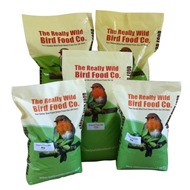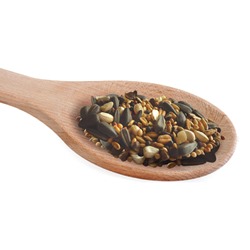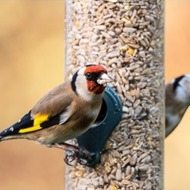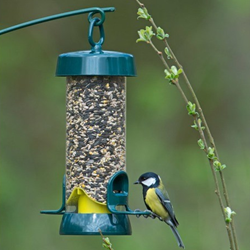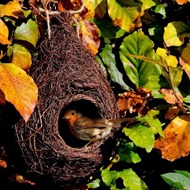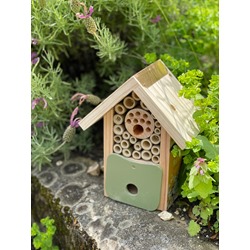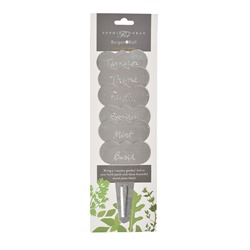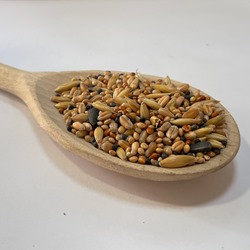
Of all wild birds, blackbirds are one of the most common and one of the easiest to identify. In total, there are over 10 million blackbirds in the UK, it's highly likely that you have one visiting your garden on a regular basis.
Their shiny black feathers and bright yellow beaks make them very easy to spot in your garden. Today we're going to get to know them a little better!
Blackbirds, also known as Turdus Merula in Latin, are part of the Turdidae family. This family is made up of lots of common songbirds including, thrushes, robins, and bluebirds. Most birds in this family have thin bills, short legs, and smooth feet (as opposed to scaly). Blackbirds can be anywhere between 23 and 25cm tall when they're fully grown & weigh between 80 and 125g.
How Should I Feed Blackbirds?
Blackbirds are primarily ground feeders as they struggle to cling to hanging feeders. So if you want to offer your garden blackbirds a tasty treat, you will need to invest in a ground feeder or bird table!
Curious to know what blackbirds like to eat? Check out our page What Do Blackbirds Eat? to learn more!
Where do blackbirds sleep?
When it comes to nesting, blackbirds are very territorial. Once they've located a spot that they like they will continue to nest and live there for the rest of their lives, so they're very quick to defend it if another bird tries to invade!
Female blackbirds are usually responsible for building the nests and they use grass, straw, and other organic material to make them nice and cosy. Of course, these nests don't last a lifetime, so after each breeding season, the female will return to re-build her nest.
Blackbird nests are typically found in the thick foliage of trees, shrubs or any low-level bush where there's suitable cover. This provides them with ample protection from predators and intruders.
Our blackbird nest boxes
If you want to give the blackbirds a helping hand with their nests this year, we have a blackbird nester that they're sure to love!
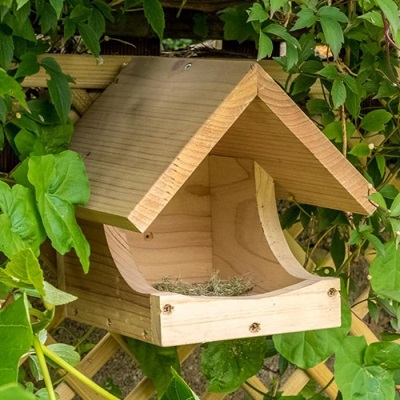
It features a deep open ledge that makes it easy to access & is made of responsibly sourced timber. You can install this next box and leave it empty, the blackbirds will bring their own nesting materials and make it their own. As we know, blackbirds like to choose a nesting spot for life, so you should get to know your new tenants quite well.
Order a Blackbird Nester >
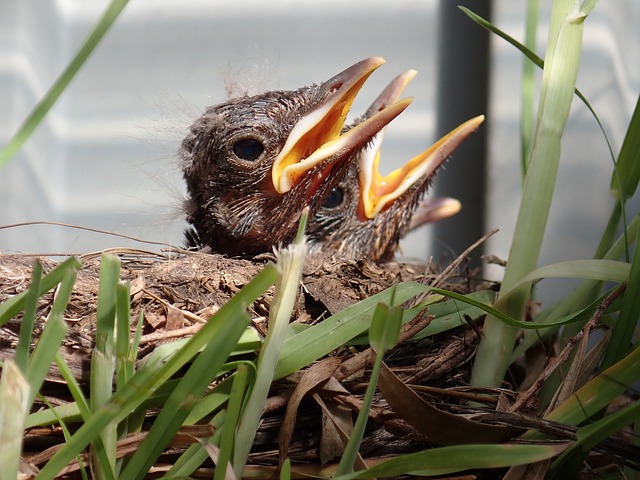
Blackbird breeding
The breeding season for blackbirds begins in spring (March) as the weather starts to get warmer and lasts for 4/5 months. During this period, blackbirds have two or three different broods, depending on the weather conditions.
There are a lot of different factors that can affect the breeding season of blackbirds. For example, if the weather is too dry or too wet, food can become scarce which puts the newly hatched chicks at risk of starvation... that's why it's so important that you offer them some food during this time!
Each brood of blackbirds is made up of 3-5 eggs which will begin to hatch after two weeks of incubation. Young blackbirds are capable of fending for themselves after the first week or so and can fledge early if predators approach the nest. This is a helpful adaptation that helps to keep the population of blackbirds strong.
Blackbirds and the law
Like many wild bird species, blackbirds and their nests are protected under the Wildlife and Countryside Act 1981. Anyone who damages these birds or their nests on purpose can be arrested!
Hopefully this bird profile answers all the questions you have about the common blackbird. If you have any other questions, don't hesitate to drop us an email at sales@reallywildbirdfood.co.uk.
 Back
Back Bird Foods
Bird Foods
 Seed Mixes
Seed Mixes Straight Seeds
Straight Seeds Mealworms & Worms
Mealworms & Worms Chicken Feed
Chicken Feed Duck Food
Duck Food Peanuts & Peanut Butter
Peanuts & Peanut Butter Suet & Fat Balls
Suet & Fat Balls No Mess Bird Seed
No Mess Bird Seed Wheat Free Bird Seed
Wheat Free Bird Seed Sunflower Seeds
Sunflower Seeds Softbill Bird Food
Softbill Bird Food Bulk Bird Seed
Bulk Bird Seed Trial Packs
Trial Packs Pick & Mix
Pick & Mix Mini Pick & Mix
Mini Pick & Mix Birdie Basics: Budget Bird Food
Birdie Basics: Budget Bird Food Food for Small Birds
Food for Small Birds Back
Back Bird Feeders
Bird Feeders
 Seed Feeders
Seed Feeders Peanut Feeders
Peanut Feeders Peanut Butter Feeders
Peanut Butter Feeders Suet & Fat Feeders
Suet & Fat Feeders Window Feeders
Window Feeders Hanging Feeders
Hanging Feeders Feeding Stations
Feeding Stations Ground Feeders
Ground Feeders Easy Clean Feeders
Easy Clean Feeders Bird Tables
Bird Tables Seed Trays
Seed Trays Bird Baths & Drinkers
Bird Baths & Drinkers Feeder Accessories
Feeder Accessories Feeder Hygiene
Feeder Hygiene Squirrel Proof Bird Feeders
Squirrel Proof Bird Feeders For the Kids
For the Kids Niger Seed Feeders
Niger Seed Feeders Mealworm Feeders
Mealworm Feeders Bird Food Storage
Bird Food Storage Fat Ball Feeders
Fat Ball Feeders Tube Feeders
Tube Feeders



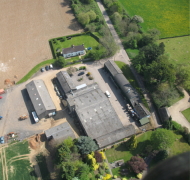 Our Farm
Our Farm
 Tips & Advice
Tips & Advice
Contact Us

